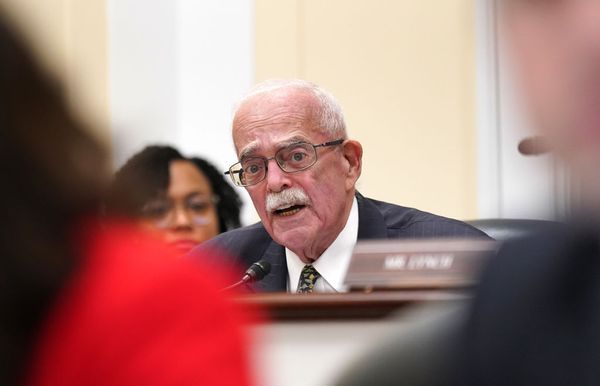California lawmakers thought they cracked the code last year on a construction union stalemate holding up housing bills.
A last-minute agreement on a package of bills from Assemblywoman Buffy Wicks, D-Oakland, and Sen. Anna Caballero, D-Merced, seemed to appease both the powerful construction unions, as well as developers and housing advocates.
Despite the 2022 victories, rifts within labor could reignite the war over how best to craft affordable housing policy.
The State Building and Construction Trades Council of California, backed by the California Labor Federation, insists that lawmakers require developers to use a “skilled and trained” workforce made up of largely union workers. On the other side, the California Conference of Carpenters supports a prevailing wage requirement — typically the union rate — rather than limiting which workers builders can hire.
The divide between the carpenters and the rest of the building trades signals a continuing impasse for housing legislation. Sen. Scott Wiener, D-San Francisco, faces strong resistance from the trades on two housing bills that would require developers to pay prevailing wages rather than hire a skilled and trained workforce.
The trades and their allies are particularly angry over Wiener’s embrace of a prevailing wage standard in Senate Bill 423, a housing bill that extends his own 2017 legislation, which previously required developers to hire union workers in some cases.
“Please tell me the last time a bill that red-lined labor standards out of existing law was passed in California?” tweeted Lorena Gonzalez, former assemblywoman and president of the Labor Federation, in response to Wiener’s bill.
Labor standards become a moving target
Worker pay has long been at the center of debates over housing bills that ease the development process for builders and incentivize more construction. Labor advocates, especially the trades, argue their members should make enough money to afford housing in their communities. Conversely, builders and housing advocates complain that stricter labor standards make projects more expensive and therefore discourage construction.
The trade unions, an influential force at the Capitol, have long pushed for stricter labor standards in housing legislation. The group has repeatedly killed bills they’ve found unsatisfactory. But their goals have changed over time, prompting tough negotiations with lawmakers authoring housing legislation.
Just five years ago, the trades fought to include prevailing wage requirements in any major housing bill, a controversial stance at the time. A “prevailing wage” is the the rate earned by the majority of workers in their respective craft in the local labor market — typically union-level wages.
Today, the trades are pushing for bills that call for developers to hire a “skilled and trained” workforce.
California law defines a “skilled and trained workforce” as one where all workers on a project must either be journey-level workers or apprentices enrolled in state-approved apprenticeship programs. At least 30% of journey-level workers in most trades must have graduated from state-approved apprenticeships. Some crafts, such as plumbers and electricians, must have at least 60% of journey-level workers graduate from state-approved apprenticeships.
Many view “skilled and trained” requirements as mandating the use of union labor, since unions run the vast majority of apprenticeship programs.
“Prevailing wage is simply — it’s good,” said Gonzalez. “However, prevailing wage is a job-by-job issue,” she continued. “We want people to go into a career for construction — not just a job.”
The debate over skilled and trained language has recently stymied many bills that attempt to “streamline” approval of affordable housing projects — one of the most popular approaches to compel housing development in recent years.
These streamlining measures limit local government authority to deny housing developments and also sometimes exempt them from onerous California Environmental Quality Act requirements.
How did we get here?
Wiener in 2017 authored a streamlining bill that included prevailing wage and skilled and trained labor standards. His measure, Senate Bill 35, fast-tracks multifamily construction in cities that have not met their state housing goals.
It also stipulates developers must hire skilled and trained workers for projects that are not 100% affordable and contain 25 or more units, depending on the size of the community.
But in 2020, Wiener could not push through a bill streamlining housing production on church-owned land, thanks to resistance from the trades. By that point, they wanted more stringent skilled and trained worker provisions.
“That’s the year that the trades informed me, and the world at large, that they no longer supported a prevailing wage requirement for 100% affordable,” Wiener said. “They want a skilled workforce.”
The San Francisco Democrat said the disagreement caused a “blow-up” in the Capitol and prompted him to drop the bill.
“It just got very, very, very contentious and intense,” he said, “and I decided it was best to pull back.”
The trades’ new goalposts for labor standards created an impasse for lawmakers authoring housing bills. But things changed in 2022 when the carpenters broke away from the trades and began backing housing bills.
They supported Wicks’ effort, Assembly Bill 2011, which opened commercial zones to affordable housing development and included language promising prevailing wage and health care benefits. The trades initially refused to back Wicks’ bill, but they eventually came around to a neutral position.
This was an easier position to take publicly because Caballero’s measure, Senate Bill 6, included language requiring developers to initially solicit bids for skilled and trained workers. Caballero’s bill, like Wicks’ legislation, fast-tracks housing development in commercial areas, although her measure is targeted at market-rate units.
Wicks, who became chair of the Assembly Housing and Community Development Committee in December 2021, said she “did not want to preside over status quo and inertia.”
“The building trades are my friends, right?” Wicks said. “This is an uncomfortable conversation when your friends don’t agree with you. But in the end of the day, we have to solve the problem. And we have to build housing.”
After the trades went neutral on Wicks’ bill late in the 2022 session, she and others were hopeful they would continue that position for future bills.
“If they want to continue to relitigate the conversation, that’s what policy committee is for,” she said. “We can continue to have the conversation.”
But, so far, they have opposed two bills from Wiener that copy language from Wicks’ bill. One measure, Senate Bill 4, would again attempt to fast-track housing on church-owned land, and SB 423 would extend SB 35.
The trades and their allies are especially angry that SB 423 doesn’t contain the skilled and trained provisions from his 2017 legislation. But Wiener and Wicks insist their prevailing wage language helps more workers.
“We want to lift all construction workers up, both unionized and non-unionized, with prevailing wage, with health benefits with wage theft protections and so forth,” Wiener said. “We believe that the language that we have in (SB 423), that was developed in AB 2011, will accomplish that.”
Trades versus carpenters
Both the trades and the carpenters agree that California is in dire need of more affordable housing. They also acknowledge the national shortage of construction workers. But the groups have conflicting visions for how to boost the state’s workforce and, ultimately, its supply of housing.
The trades say they want to “move the socioeconomic needle” by enrolling workers in apprenticeship programs and putting them on a pathway to the middle class.
But because apprentices learn through on-the-job experience, market conditions and labor demand can limit the number of new recruits each year. A skilled and trained requirement would guarantee job availability and boost graduation from apprenticeship programs, the trades argue, eventually helping the state rebuild its construction workforce.
“You can’t have a robust apprenticeship program if you don’t have the skilled and trained language in these projects,” Gonzalez said. “Because then you don’t know that you’ll need apprentices.”
On the other hand, the carpenters and their allies contend that a skilled and trained requirement would aggravate an already strapped workforce. The state graduates fewer than 10,000 apprentices each year across all crafts, according to data compiled by the NorCal Carpenters Union.
Housing advocates and developers say projects could become delayed due to competition over a limited pool of qualified workers. Strict labor standards on Los Angeles-area affordable housing projects led to a 15% increase in cost according to a Rand Corporation study that advocates often point to as proof that skilled and trained will raise prices and dissuade developers.
The carpenters pointed out that AB 2011, SB 4 and SB 423 all require contractors on projects of more than 50 units to participate in state-approved apprenticeship programs or request apprentices from other programs.
They also argue that unions should bear the responsibility of unionizing workers and guaranteeing them living wages — not the state.
“It’s the job of the union to organize, not the government to organize for us,” said Jay Bradshaw, executive secretary and treasurer of the Northern California Carpenters Union. “Our mandate is to help workers, and our best protection for our current workforce is to grow.”
Wiener and Wicks say their top priority is coming together with any willing partners to find ways to build more housing in California.
“It’s unfortunate, because we all should be in one grand coalition,” Wiener said, “supporting more housing and supporting workers.”







